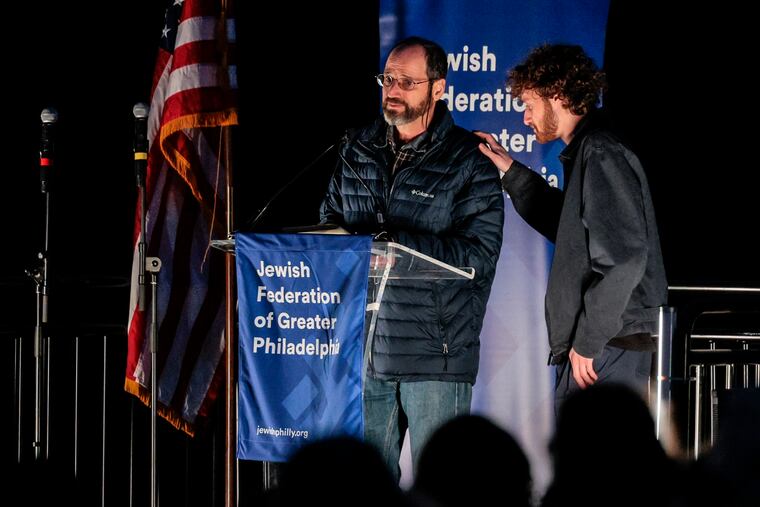An Ardmore man says his 84-year-old Israeli stepmother is missing and believed to be in Gaza
Ditza Heiman, 84, is believed to be among more than 100 hostages taken from Israel Saturday during an attack staged by Hamas. Her stepson, Amichai Shdaimah of Ardmore, is pleading for help.

An Ardmore man says his 84-year-old Israeli stepmother who lives near the border with Gaza has been missing since last weekend and is believed to have been taken from her home by Hamas.
Amichai Shdaimah, who has lived in the Philadelphia suburbs for 26 years, said Friday that his stepmother, Ditza Heiman, is considered to be among scores of Israelis taken hostage during last weekend’s terrorist attack. The mother and stepmother of seven is from Kibbutz Nir Oz, an agricultural community of about 400 people in southern Israel that sits less than two miles from the border with Gaza.
Shdaimah, 59, a father of three, said his stepmother likely hid in a safe room inside her home Saturday morning as attackers descended on the kibbutz and shot indiscriminately. He said a neighbor told family members that he heard Heiman calling for help, but when he went outside, her home was surrounded by militants.
Heiman’s family members tried calling her repeatedly. Hours later, Shdaimah said, someone finally picked up: a man who spoke in Arabic and said “Hamas, Hamas.”
» READ MORE: Residents of Philly region grieve for loved ones in Israel and Gaza as war intensifies
Heiman was last seen in what Shdaimah described as a Hamas propaganda video that was posted on social media earlier this week. A screenshot shared with The Inquirer appears to show Heiman being led away from her home and into a car.
Shdaimah said he and his family are desperate for information on her whereabouts and are connecting with governments and nongovernmental organizations to attempt to get medication to her. He said his wife has been in touch with the U.S. State Department, and that other family members have been in touch with Israeli intelligence officials.
Shdaimah also attended and spoke Monday at a rally in support of Israel in Wynnewood.
He said his family is keeping busy and spreading the word about her in part to get through “unimaginable” pain.
“We are trying not to think what she is going through,” he said, “because if you start imagining that, it’s unbearable.”
Saturday’s incursion by Hamas, a militant group that governs Gaza, left more than 1,200 Israelis dead, according to military officials. In addition to the hundreds of civilian casualties on the deadliest day in the nation’s history, more than 150 people are missing and are considered to be hostages. Nir Oz was a focal point of the invasion — dozens of residents were killed or taken captive.
The attack plunged the Middle East into a state of war. Israel’s leadership has vowed to eliminate Hamas and has bombarded Palestinian territories with airstrikes, killing more than 1,700 people, according to the Palestinian Health Ministry.
The Israel Defense Forces on Friday warned the United Nations that Palestinians in northern Gaza should evacuate, signaling that a ground invasion could be imminent. Authorities said IDF soldiers have already conducted raids in Gaza over the past 24 hours to search for hostages.
Shdaimah said his family’s message to the international community is simple: “Put the hostages first, before any other effort.” He said his family also wants civilians in Gaza “to get the help they need.”
Although Heiman is not Shdaimah’s biological mother — his father was her longtime partner — he said she “adopted our entire family” and that his children refer to her as their savta, Hebrew for grandmother.
Shdaimah said he and his family, including three children who attended school in the Lower Merion School District, visited Israel annually while his kids were growing up. They always started their trip in Nir Oz, he said, where Heiman would warmly welcome them with the kids’ favorite chicken and matzo ball soup.
Now that the children are grown, Shdaimah said, they still visit Israel and stop at Nir Oz while there. Even later in her life, Heiman always insisted that she cook — alone — for the entire family.
“She was hosting them in the kibbutz and they were definitely attached,” Shdaimah said. “It’s like she’s their grandmother. We don’t consider her adopted or stepmother.”
Heiman was one of the early founders of the kibbutz, Shdaimah said, and was used to going to her house’s safe room when alerts would blare. She knew it was a conflict zone, but “she never considered leaving the kibbutz,” he said.
“There were previous conflicts,” he said. “But never anything even close to this.”